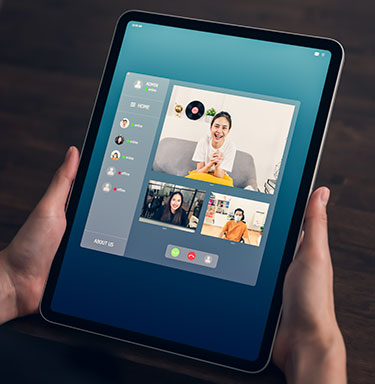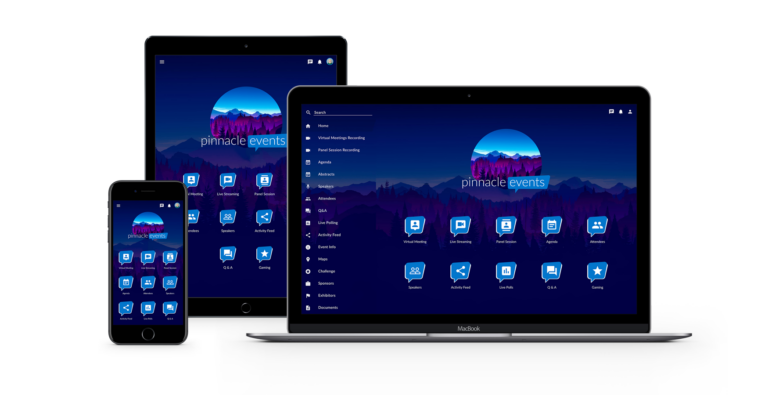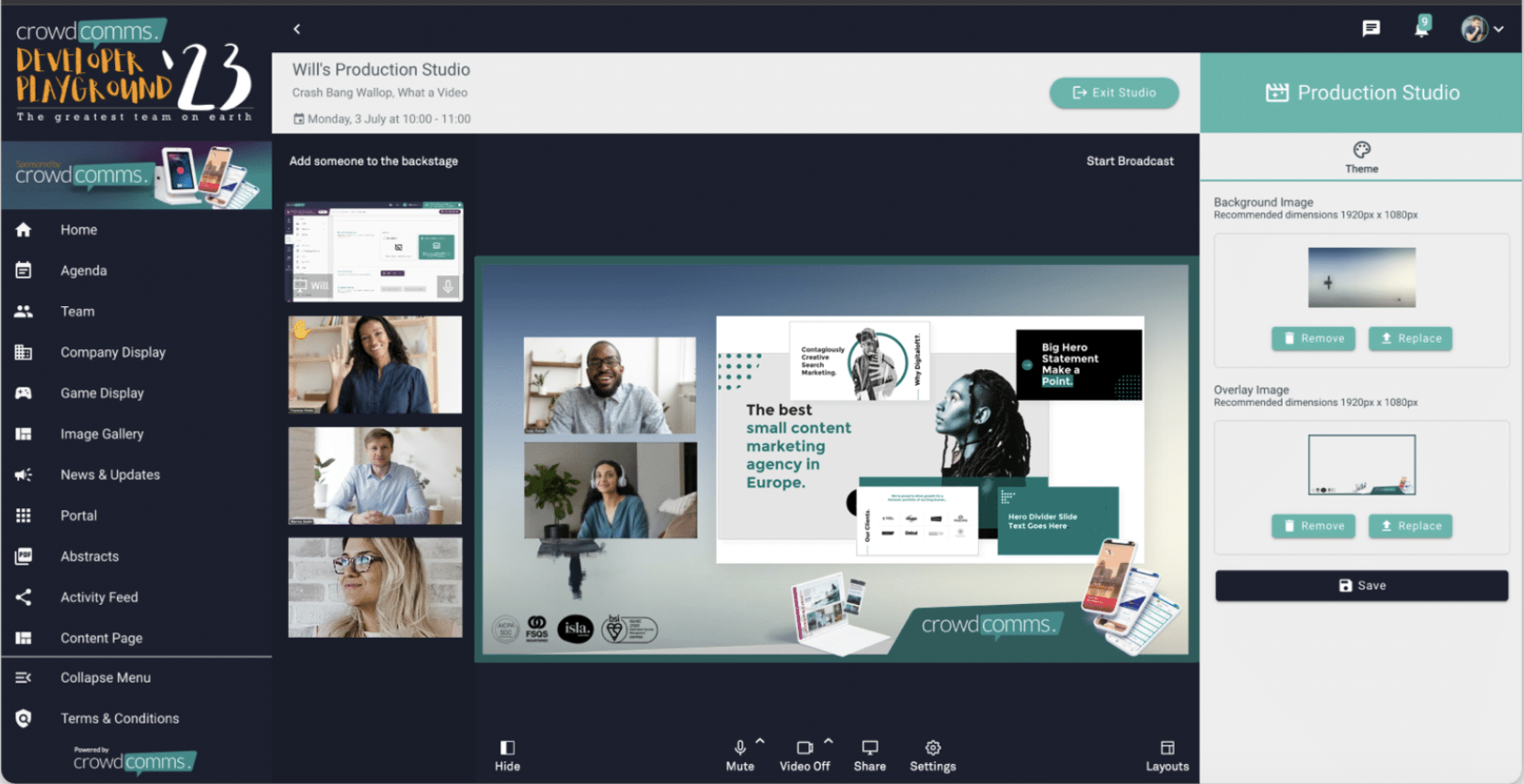
What is an Online Event?
An online event (or virtual event) is any organised gathering hosted over the internet. It could be a small-scale webinar, a multi-day virtual conference, or even a live-streamed in-person event. Online events leverage digital platforms to bring people together in real-time or on-demand, offering businesses and organisations a chance to interact with their audiences in meaningful ways.
The beauty of online events isn’t just their flexibility—it’s their accessibility and scalability, which makes them an invaluable tool for small business owners, event planners, and marketing professionals alike.
Is it different to a Virtual Event?
The terms “online event” and “virtual event” are often used interchangeably, but there can be distinct differences depending on the context. At their core, both involve hosting gatherings in a digital environment. However, the format, scope, and level of interaction can set them apart.
A virtual event typically refers to a fully digital experience, where all activities—whether a virtual conference, virtual meeting, or entertainment session—happen online. Virtual events often incorporate technology to replicate many aspects of in-person gatherings, from keynote sessions to networking opportunities. For instance, a virtual conference may include multiple breakout rooms and panel discussions, enabling attendees to participate in a structured yet flexible environment.
On the other hand, an online event is a broader term. It can encompass live events streamed for virtual attendees, such as a live broadcast of a product launch, or even hybrid events. Hybrid events include both in-person and virtual components, giving attendees the option to participate either onsite or remotely. This format bridges the gap between physical and digital engagement, offering a seamless experience tailored to diverse preferences.
Ultimately, the key distinction rests in how the event is structured and delivered. While virtual events are entirely digital, live events and hybrid setups bring additional layers of versatility. Both types cater to virtual attendees but do so in unique ways, making it vital to choose the format that aligns with your audience’s needs and goals.
Planning Your Online Event
Now that you understand what an online event is let’s dive into how to plan one successfully. The first step is to define your event goals and objectives. Are you looking to generate leads for your business? Build brand awareness? Educate your audience about a new product or service? Knowing the purpose of your event will help guide all other planning decisions.
Next, consider your target audience. Who do you want to attend this event and what would motivate them to join? This information will be crucial in shaping your marketing strategy and creating content that resonates with your intended attendees.
Once you have a clear idea of your goals and audience, it’s time to choose a date and time for your online event. Take into account any potential conflicts with holidays, industry events, or competing virtual events. Additionally, think about the ideal time zone for the majority of your attendees and schedule accordingly.
Choosing the Right Virtual Event Platform
Selecting the right virtual event platform is crucial for a successful online event. There are numerous options available, each with its own set of features and pricing plans. Consider factors such as the number of attendees, interactivity options, and technical support when making your decision.
It’s also essential to test out the platform before your event to ensure everything runs smoothly. Conduct a run-through with your team or even invite a few friends to participate in a mock session. This will help you identify any potential issues and make necessary adjustments beforehand.
Even at in person events, engaging an audience can sometimes be a challenge. For your virtual event, you’ll want a platform that strengthens audience participation and engagement. Live chat is an indispensable feature that allows participants to interact with speakers, hosts, and each other in real-time. Polls, surveys, and Q&A sessions are also effective ways to engage attendees and gather valuable feedback.
Another vital aspect to consider when choosing a virtual event platform is the technical support provided. In case of any technical issues during your event, having a responsive support team can make all the difference in ensuring a smooth experience for both you and your attendees.
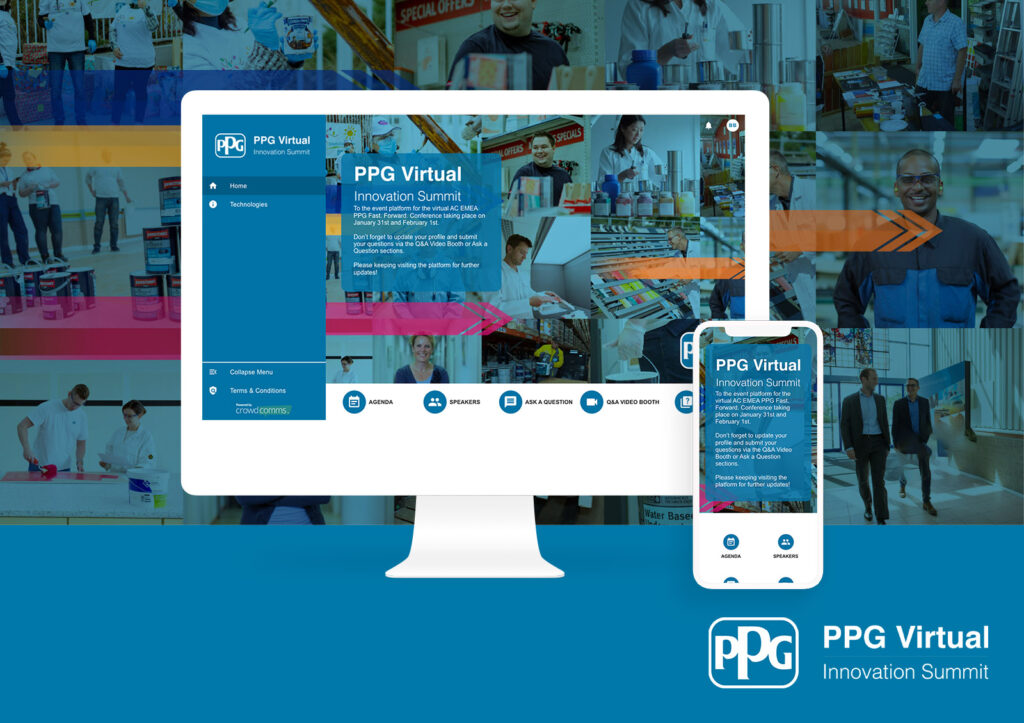
Event Organisers: Tips for Success
As an event organiser, your role is crucial in ensuring the success of your online event. Before we dive into the detail, here is an overview of what to keep in mind as you plan and execute your online event:
- Keep communication lines open with all stakeholders involved, including speakers, sponsors, and attendees.
- Promote your event through various channels such as email marketing, social media, and targeted advertising.
- Create engaging content that captures the attention of your audience and aligns with your event goals.
- Utilise interactive features on the virtual event platform to keep attendees engaged and encouraged to participate actively.
- Test technology beforehand to avoid any technical glitches during the live event.
- Gather participant feedback after the event to evaluate its success and identify areas for improvement.
By following these tips, you’ll be well on your way to organizing a successful online event that achieves your objectives and leaves a lasting impression on attendees. With the right planning, promotion, and execution, online events can be an incredibly effective tool for connecting with your audience in today’s digital landscape. So go ahead and explore the endless possibilities of hosting an engaging online event for your business or organisation!
Keep learning and adapting as new technologies emerge to ensure that your events continue to evolve and deliver value to all involved. The sky’s the limit when it comes to creating meaningful connections through virtual gatherings!
As technology continues to advance, so do our possibilities for hosting successful online events. With the right planning and execution, virtual events can offer unique benefits such as cost savings, global reach, and increased accessibility.
In addition to replicating traditional event elements, online events also provide opportunities for innovation and creativity. For example, you can include interactive games or virtual product demonstrations to engage attendees in a fun and memorable way.
Promotion and Attendee Engagement Strategies
Just like with any event, promotion is critical to its success. Utilise various marketing channels such as social media, email newsletters, and targeted online ads to reach your audience. Create compelling content that entices people to register and attend.
During the event, make sure to engage attendees through interactive features such as live polls, Q&A sessions or networking opportunities. Keep the momentum going by providing relevant resources and follow-up materials after the event.
To create an event that truly resonates with your audience, consider incorporating breakout sessions, interactive workshops, and leveraging event technology.
These elements not only foster active participation but also provide opportunities for attendees to learn, network, and exchange ideas.
Additionally, measuring the success of your event is crucial to understanding its impact and refining future strategies. Whether it’s a virtual or online event, embracing best practices and leveraging the power of technology can help you create a memorable and engaging experience for all participants.
Understanding Your Audience
Before you start planning your event, take a moment to think about who your event is for. Knowing your target audience is essential to crafting content and experiences that they’ll find valuable. Here are a few tips for identifying and understanding your audience:
- Demographics: Consider age, location, profession, and other key demographic factors.
- Pain Points: What challenges are they facing that your event can help address?
- Interests: Identify topics and themes your audience cares about.
- Preferred Platforms: Understand where your audience spends time online; this can help you choose the right platform to host your event.
Pro Tip 💡 Use surveys, social listening tools, and customer feedback to gather insights into your audience’s preferences.

Choosing the Right Conference Format
The format you choose can make or break your event. Here are some common online event formats and when to use them:
- Webinars: Best for education or training. They work well for sharing in-depth knowledge with a smaller, focused audience.
- Virtual Conferences: Ideal for large gatherings with multiple speakers, breakout sessions, and interactive elements. These mirror traditional in-person conferences.
- Live Streams: Perfect for product launches, Q&A sessions, or live entertainment. Live streaming creates a sense of exclusivity and immediacy, encouraging real-time engagement.
- Hybrid Events: Combine in-person and virtual elements for maximum reach and accessibility—an increasingly popular choice for businesses looking to cater to diverse attendee preferences.
Select a format that aligns with the goals of your event and provides the best experience for your audience.
Planning Your Event
Great online events don’t just happen—they’re carefully planned. Here’s a step-by-step guide to help you organise your next virtual event:
- Set Clear Goals: What do you want to achieve? Whether it’s lead generation, brand awareness, or customer engagement, define your objectives from the start.
- Select a Platform: Choose reliable software that supports your event’s format and goals. Popular platforms include Zoom, Microsoft Teams, and Hopin.
- Build a Timeline: Plan your event schedule, including promotional activities, speaker preparation, and tech setup.
- Secure Speakers & Moderators: Invite experts, influencers, or industry leaders to speak. Ensure they understand what’s expected and have all the tools they need for success.
- Prepare Content: Craft presentations, video content, and supporting materials well in advance. Make sure the content is visually appealing and engaging.
- Test Equipment: Conduct a full tech rehearsal to troubleshoot any potential issues, from audio delays to screen-sharing glitches.
Being prepared is the best way to guarantee a seamless experience for both your team and your attendees.
Promoting Your Event
Promotion is key to driving attendance and engagement. Here are some effective strategies to get the word out:
- Social Media: Create event pages on Facebook or LinkedIn, use Instagram Stories, and post teasers or countdowns to generate buzz.
- Email Marketing: Send out invitations and reminders to your email list. Make your emails eye-catching and include clear calls-to-action.
- Partnerships: Collaborate with influencers or other organisations to amplify your reach.
- Paid Advertising: Platforms like Google Ads or Facebook Ads can help you target a specific audience, ensuring your event reaches the right people.
Remember, consistency is key. Start your promotions early and ramp up as the event date approaches.
How Do You Live Stream Your Event?
Live streaming can elevate your event, offering real-time engagement and excitement. Here’s how to live stream successfully:
- Choose a Platform: Facebook Live, YouTube Live, and Twitch are popular choices. For a more professional presentation, tools like StreamYard or OBS Studio are excellent options.
- Invest in Equipment: Good-quality cameras, microphones, and lighting are essential for a polished look and clear sound.
- Test Your Tech: Run a practice session to ensure your internet connection is stable and your equipment works flawlessly.
- Engage Your Audience: Use interactive elements like live Q&A sessions, polls, or shout-outs to keep viewers engaged.
- Record the Session: Recording your live stream ensures you can repurpose the content for social media, blogs, or on-demand access later.
Live streaming an in-person event? Coordinate with your venue early to ensure a reliable internet connection and optimal camera positioning.
Post-Event Strategies
The event may be over, but your work isn’t done yet. Following up with attendees is crucial for maximising the impact of your online event.
- Send Thank-You Emails: Express gratitude to attendees, speakers, and sponsors. Include links to post-event surveys or on-demand content.
- Gather Feedback: Use surveys to understand what worked well and what could be improved.
- Analyse Performance: Measure engagement rates, attendance numbers, and leads generated to assess the event’s success.
- Stay Connected: Share event highlights or recordings on social media to keep the conversation going. This is also a great opportunity to promote upcoming events.
Exhibitor Networking: Connect and Collaborate
We can’t forget about exhibitors when it comes to virtual or online events.
Networking is a key aspect of any event, even in the virtual space.
You can encourage attendees to interact with exhibitors through virtual chat rooms or discussion forums or an enhanced exhibitor listing.
Provide opportunities for attendees to schedule one-on-one video meetings, fostering connections and collaboration among participants. Remember, networking is not limited to the event itself. Encourage attendees to connect on social media platforms, such as LinkedIn, to continue the conversation and build lasting relationships.
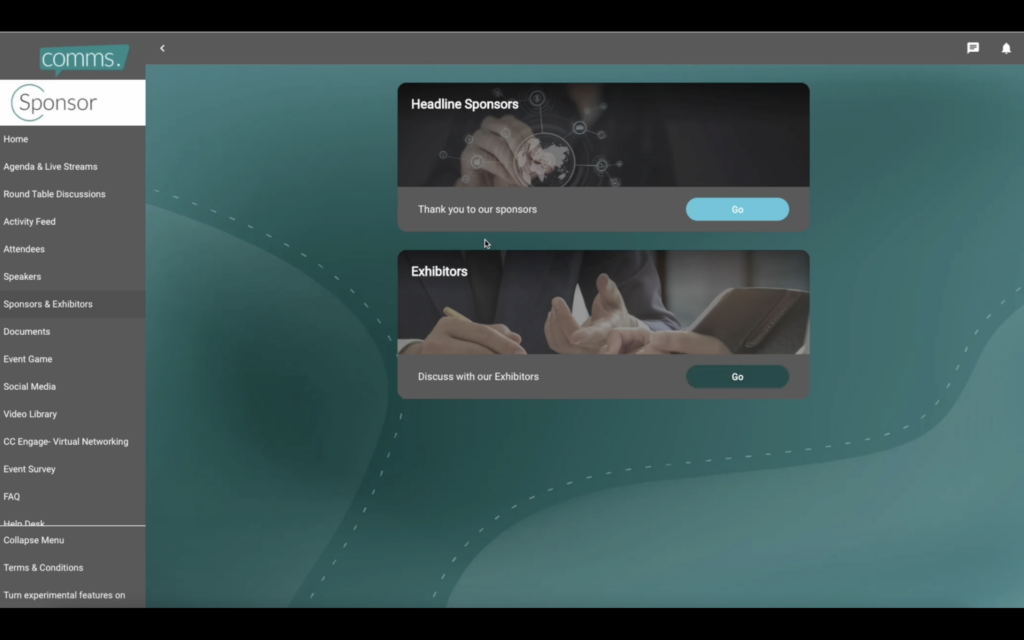
Exhibitors: Showcasing Innovation and Solutions
Exhibitors play a vital role in virtual events, offering innovative solutions, products, and services to attendees. Provide exhibitors with a platform to showcase their offerings through virtual booths or dedicated web pages. Encourage attendees to explore these exhibits, engage with exhibitors through chat or video meetings, and discover new opportunities or solutions that align with their needs.
Virtual Event Platform: The Foundation of Success
Selecting the right virtual event platform is crucial in delivering a seamless and engaging event experience. Look for a platform that offers robust features such as interactive sessions, live streaming capabilities, audience engagement tools, and analytics to measure event success.
A reliable virtual event platform ensures smooth event execution and enhances attendee satisfaction. Have a look at what CrowdComms have been up to, the Best Virtual Event Platform for 2025.
With the right networking opportunities, a mobile event app, engaging exhibitors, and a reliable virtual event platform, you can create an unforgettable virtual event experience. Attendees will have the chance to connect, collaborate, explore innovative solutions, and make the most out of your event agenda. Elevate your virtual events and unlock their full potential.
Bring your online community together
Use CrowdComms Virtual Event tools to easily host online events with your audience. CrowdComms offers an all-in-one virtual event platform with integrated networking, engagement tools, and analytics for a seamless virtual experience. Bring your online community together today! Click here to learn more about our virtual event platform.
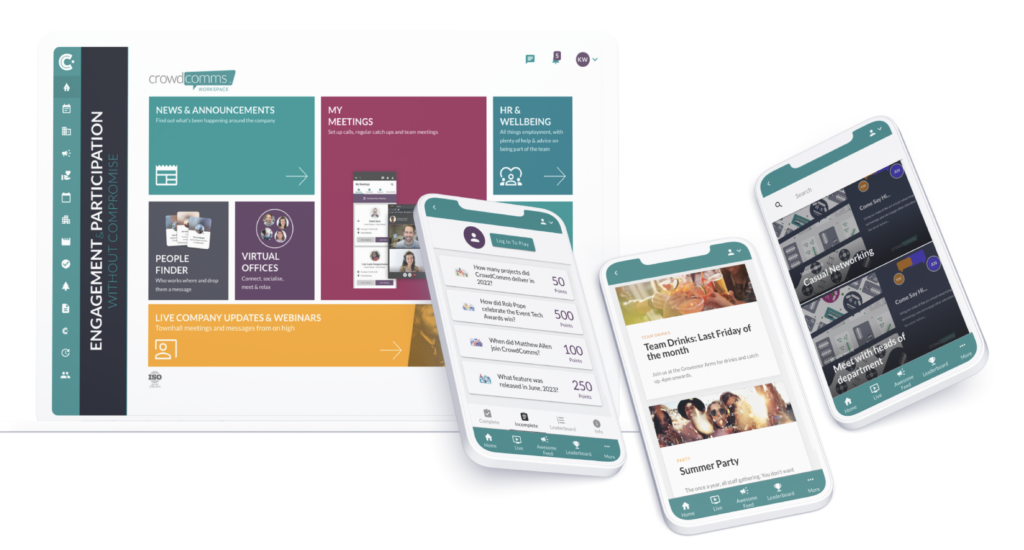
Internal Hybrid Events and Conferences
Virtual townhalls, sales launches, companywide events, conferences, training sessions, department meetings etc. are all forms of online events.
In organisations across continents and countries, internal hybrid events are used for communicating messages throughout the business and it is easier and more cost effective to host a spread wide company audience online.
An internal Hybrid event can bring in a multi-faceted experience for your team while keeping everyone connected and aligned with company goals. Our platform offers features such as live chat, interactive polls and Q&A sessions, ensuring employee engagement and participation. With our user-friendly platform, you can easily create a memorable hybrid event that connects your team regardless of their location.

Are Virtual Events Dead?
Virtual events are not dead but rather evolving into a new era of hybrid events. While in-person events will always have their place, virtual and hybrid events offer unique opportunities and benefits that cannot be ignored. In our July 2024 Event Advice video, we discussed this very topic, which ou can watch in full here.
What Makes Virtual Events Special?
Virtual events offer a host of benefits that make them truly special and worth embracing:
- Global Reach: With virtual events, geographical barriers become a thing of the past. You can connect with attendees from across the globe, expanding your reach and tapping into a diverse audience.
- Cost-Effectiveness: Virtual events eliminate the need for travel, accommodation, and venue expenses. This cost-effectiveness allows you to allocate resources more efficiently and potentially offer more value to your attendees.
- Flexibility and Convenience: Attendees can participate in virtual events from the comfort of their own homes or offices, eliminating the need for travel and enabling them to join sessions at their convenience. This flexibility encourages higher attendance rates and greater engagement.
- Data and Analytics: Virtual events provide valuable insights into attendee behaviour and preferences through data and analytics. This information can help you tailor future events, personalise the attendee experience, and measure the success of your event strategies.
- Sustainability: By reducing the carbon footprint associated with travel and physical event infrastructure, virtual events contribute to a more sustainable future. Embracing virtual events aligns with environmental goals and showcases your commitment to responsible practices.
Virtual events offer an array of benefits, including global reach, cost-effectiveness, convenience, data-driven insights, and sustainability. By leveraging these advantages, you can create engaging and impactful experiences that connect with your audience on a global scale.
Wrapping Up Virtual Events
Hosting an online event isn’t just an effective way to connect with your audience—it’s also an opportunity to showcase your brand’s value, knowledge, and community.
By understanding your audience, choosing the right format, planning meticulously, and following up strategically, you can create an event that leaves both you and your attendees excited for more.
Ready to take your online events to the next level? With the right tools, resources, and mindset, your next virtual event could be your most successful one yet. Why not start brainstorming today?


